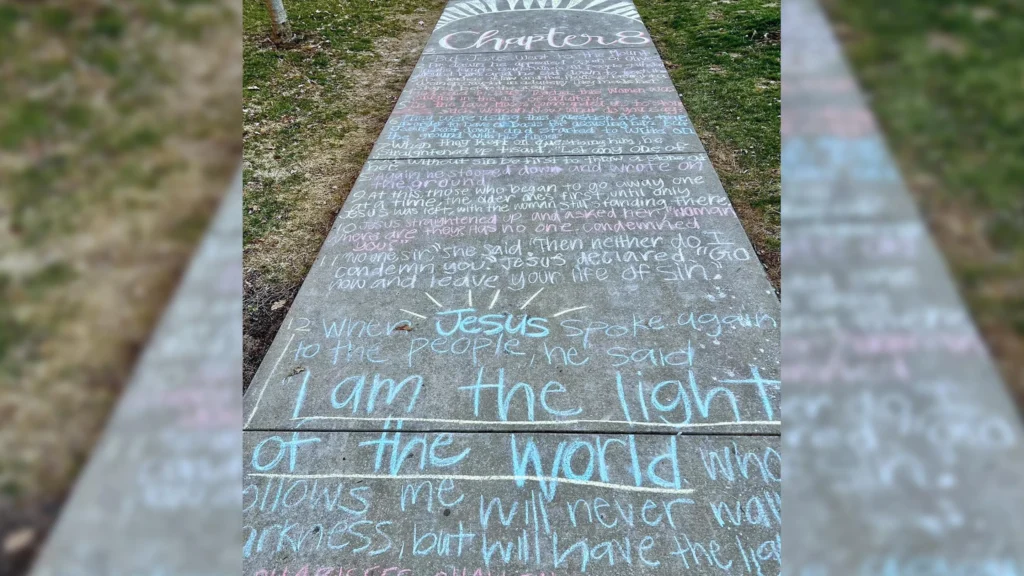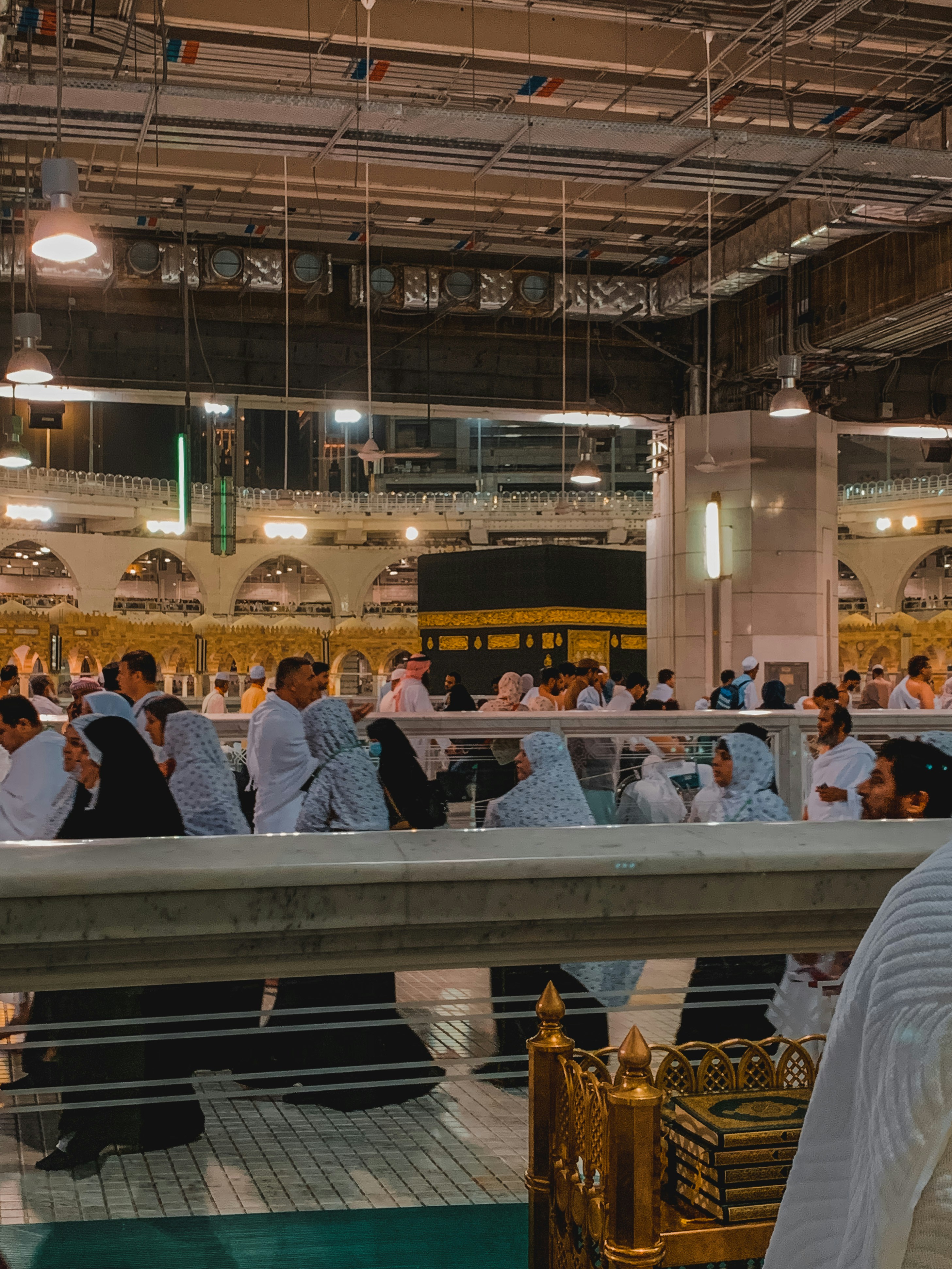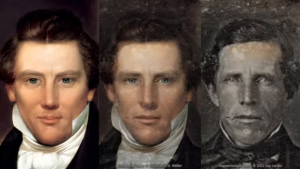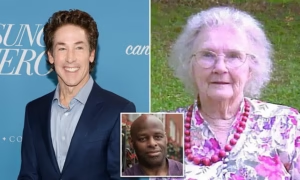Chalking the Gospel: A Unique Outreach by WKU Christian Students

Introduction to Chalking in WKU
The initiative undertaken by Christian students at Western Kentucky University (WKU) to chalk the entire Gospel of John on campus represents a distinctive form of outreach and evangelism. This project, organized by a group of dedicated students, seeks to share the teachings and message of Jesus Christ in a visually engaging manner. Chalking the Gospel allows students to creatively express their faith while simultaneously reaching out to their peers, fostering a space for dialogue and reflection on Christian beliefs.
This outreach effort stems from a desire to connect with fellow students in a way that is accessible and thought-provoking. By inscribing the text of the Gospel onto campus sidewalks and walls, the initiative provides a daily reminder of the Christian faith in a secular environment. The choice of the Gospel of John is particularly significant, as it emphasizes the divinity of Christ, offering a comprehensive account of His life, messages, and profound love for humanity. Sharing this Gospel text in a public format creates opportunities for discussion, encouraging students to explore their own beliefs and fostering a sense of community.
Moreover, the act of chalking symbolizes a fresh approach to evangelism, leveraging the commonality of university life to invite students into conversations around spirituality and faith. Each chalked verse serves as an invitation for self-reflection, enabling individuals to engage with the text at their own pace. The initiative not only enhances the campus aesthetic but also illustrates the commitment of WKU Christian students to be proactive in spreading the message of Christ, striving for inclusivity and understanding in their outreach efforts.
The Vision Behind the Movement
The chalking initiative at Western Kentucky University (WKU) emerged from a shared vision among the students involved in the outreach program. The students envisioned creating a tangible way to spread messages of hope, love, and inspiration, deeply rooted in their Christian faith. This grassroots effort aimed to connect with their peers authentically and meaningfully, by communicating messages that resonate with the diverse student body.
One of the primary motivations behind this outreach was the desire to foster a sense of community and belonging among students. Many participants expressed that they often felt disconnected from their surroundings and believed that chalking could serve as a bridge to engage fellow students in conversations about spirituality and personal growth. The bright colors and playful designs of the chalk art not only attract attention but also invite dialogues about faith and its relevance in everyday life.
Interviews with several participants revealed that their involvement was inspired by a personal calling to share their faith. For instance, one student mentioned, “I felt compelled to be an instrument of positivity in a world that often feels heavy. Chalking messages allows me to contribute to a culture of kindness and understanding.” This sentiment echoed among the participants, many of whom shared stories of how their faith had transformed their lives and encouraged them to give back to their community.
Additionally, the students found inspiration from various scripture passages and personal testimonies of faith. They aimed to convey themes of hope, love, and redemption through their artwork, ensuring that the chalked messages would leave a lasting impact on those who encountered them. Ultimately, the vision behind the chalking initiative is to ignite conversations and foster connections that encourage students to explore their beliefs while creating an inclusive environment for all. This endeavor reflects a profound commitment to outreach, driven by a genuine passion for sharing the Gospel in a modern, relatable way.
The Process of Chalking the Gospel
The chalking project undertaken by the WKU Christian students is a carefully orchestrated initiative that requires extensive planning and organization. The first step in this process involves selecting appropriate locations across the campus where students can gather and effectively reach their target audience. Various factors such as foot traffic, visibility, and student engagement are taken into account when determining these sites. Once locations are identified, the next phase involves rallying volunteers who are enthusiastic about participating in this outreach program.
Regarding materials, students predominantly use colorful chalk that adheres well to pavement surfaces yet remains easily washable, ensuring no long-lasting effects on the campus environment. Choosing the right chalk is essential; it allows for artistry in conveying messages while being environmentally friendly. Moreover, the messages crafted on the sidewalks include scripture verses, inspirational quotes, and personal testimonies, all designed to resonate deeply with passersby. The creative aspect of this initiative enables students to express their individual artistic styles while maintaining a unified theme throughout the chalked messages.
As the chalking day approaches, students engage in a collaborative planning meeting where they discuss different design ideas, establish roles, and assign tasks to volunteers. This fosters camaraderie among participants, creating an atmosphere of collective purpose. During execution, challenges may arise, such as unpredictable weather or insufficient time. However, students have learned to adapt by setting dates to accommodate weather forecasts and keeping backup plans ready. This adaptability not only ensures the project’s success but also enriches the participants’ experience, fostering teamwork and resilience as they share the Gospel message creatively. The outcome is an event that not only highlights their faith but also invites the broader community to engage in thoughtful reflection.
Community Engagement and Reactions
The chalking of the Gospel by WKU Christian students has elicited a wide range of responses from the campus community, reflecting the diverse perspectives held within it. Many students have expressed appreciation for the initiative, indicating that the visible messages of faith and hope resonate with their personal beliefs or encourage reflection on spiritual matters. Positive reactions generally highlight the creativity of chalk art and the thought-provoking nature of the messages. Some students have conveyed that the chalking has sparked meaningful conversations among peers, prompting them to explore deeper theological discussions, thus enhancing their engagement with faith in a communal context.
Conversely, some faculty and staff members have raised concerns regarding the chalking’s implications. Questions surrounding the appropriateness of religious expression in a public university setting have entered the dialogue, suggesting that while free speech is a cornerstone of academic life, establishing boundaries for expression is equally important. This interaction has underscored the necessity of fostering an environment where diverse viewpoints can coexist amicably, albeit sometimes contentiously. Critics argue that while faith-sharing is vital, it should not overshadow the secular nature of the educational institution. Such conversations help bridge gaps between differing ideologies, paving the way for mutual respect and understanding.
The Influence of Social Media
Social media has emerged as a powerful tool for communication, allowing individuals and organizations to engage with wider audiences in unprecedented ways. For the WKU Christian students involved in the chalking outreach effort, platforms such as Instagram, Facebook, and Twitter were instrumental in promoting their message and documenting their activities. As students chalked uplifting messages on campus sidewalks, they simultaneously shared photographs and videos of their work online, showcasing their efforts to a broader community.
This real-time documentation served multiple purposes: it not only increased visibility for their initiative but also encouraged dialogue among peers and beyond. Posts tagged with relevant hashtags attracted viewers who may not have previously interacted with the WKU Christian community, expanding the outreach beyond local boundaries. The incorporation of visual content—vivid images of chalked messages coupled with engaging captions—encouraged shares and comments. This engagement from the wider audience provided the students with an affirmation of their mission, reinforcing their commitment to spreading positivity and faith.
The interactive nature of social media platforms allowed for immediate feedback from followers, creating a sense of community and support. Likes, shares, and comments acted as forms of validation, motivating the students to continue their chalking efforts and consider future outreach initiatives. As they observed their messages resonating with individuals from various backgrounds, the impact of social media became evident. It transformed a localized activity into a larger conversation about faith, hope, and student involvement. This demonstrates that social media not only extends the reach of messages but also fosters connections among diverse groups, amplifying their influence and effects.
Theological Significance of Sharing the Gospel
The act of sharing the Gospel holds profound theological significance within Christian doctrine, as it embodies the essence of Christ’s commission to His followers. The Great Commission, found in Matthew 28:19-20, serves as a foundational scriptural mandate for all Christians, urging them to make disciples of all nations. This direct command highlights the imperative nature of evangelism, where sharing the faith is not merely a choice but a responsibility. By participating in outreach efforts, such as chalking the Gospel, believers actively engage in fulfilling this divine directive.
The practice of disseminating the Christian message in public spaces emphasizes the importance of visibility and accessibility in faith expression. Mark 16:15 further reinforces this concept, as Jesus instructs His followers to “go into all the world and preach the gospel to all creation.” This encouragement to reach diverse audiences underscores the belief that the message of salvation is intended for everyone, transcending geographical and cultural barriers. Creative expressions, such as chalk art, serve as innovative avenues to communicate fundamental truths of Christianity, inviting dialogue and reflection in everyday settings.
Reflections from Participants
Participating in the chalking outreach has been a transformative experience for many students involved at Western Kentucky University. One participant, Sarah, expressed her initial apprehension about engaging with passersby through chalk messages. She noted that “the joy of sharing our faith transformed my fear into excitement.” Sarah felt that the vibrant colors and imaginative designs drew in attention, making meaningful conversations easier to initiate.
Another participant, Jeremy, shared how the outreach deepened his understanding of community engagement. “Before this event, I never considered how art could be a catalyst for faith-sharing,” he remarked. The physical act of chalking the gospel verses allowed him to reflect on the significance of conveying messages of hope in creative ways. Engaging with fellow students and witnessing their reactions to the chalk created a sense of unity among participants and strengthened his sense of belonging within the group.
Emily, who had little prior experience in outreach activities, described a moment where a passerby paused to read a message she had written. “Seeing someone smile and nod while I shared the meaning behind my chosen verse was incredible,” she recalled. This interaction not only reinforced her faith but also ignited a passion for outreach that she plans to pursue in future initiatives. The chalking process provided her with an avenue to express her beliefs visually and personally connect with others.
The reflections of these students demonstrate the profound impact of the chalking outreach on their lives. It has not only enhanced their ability to share their faith but has also taught them valuable lessons about creativity, collaboration, and the importance of reaching out to the community in innovative ways. As these students continue to engage in outreach activities, it is clear that their experiences will shape their future endeavors and commitment to their faith.
Future Plans and Continuing Outreach
As the WKU Christian student community reflects on the success of their recent chalk outreach, they are already planning future initiatives to foster inclusive dialogue about faith and spirituality on campus. The promising engagement observed during their chalking events has encouraged them to explore similar creative strategies that resonate with their peers while sharing Christ’s message. The students hope to establish a recurring outreach program that incorporates various artistic expressions and platforms for engagement, including digital mediums, art exhibitions, and community service efforts.
From their chalk outreach experience, the students learned the importance of interaction and community-building in sharing the Gospel. They discovered that visually appealing expressions of faith can pique interest and lead to meaningful conversations. The positive responses they received during their chalking sessions reinforced their belief that faith-related initiatives can spark curiosity and lead individuals to explore Christianity further. The insights gained from this initiative will undoubtedly shape their future plans.
Furthermore, the students aspire to deepen their engagement with the campus community by partnering with other organizations and student groups. They recognize that collaboration can enhance their outreach efforts and create a more inclusive environment for discussions about spirituality and faith. By working with diverse organizations, they aim to create spaces in which individuals can express their thoughts and share their beliefs in a supportive atmosphere.
In pursuit of their mission, the WKU Christian students are committed to continuously evaluating and adapting their outreach strategies based on feedback, experiences, and emerging trends in student interests. These efforts highlight their dedication to spreading Christ’s message and fostering faith-based connections within the university environment. As they look to the future, they remain hopeful that their initiatives will inspire and encourage meaningful conversations about spirituality among their peers.
Conclusion: The Impact of Creativity in Faith
The chalking initiative orchestrated by WKU Christian students highlights the profound influence that creativity can exert in the realm of faith outreach. By utilizing a simple yet effective medium—chalk—these students have crafted visual expressions that transcend conventional methods of evangelism. This approach not only engages passersby but also invites individuals into a dialogue about faith, spirituality, and personal experiences. The brightly colored messages, coupled with artistic designs, have the potential to capture attention and spark curiosity among a diverse audience.
Creativity, in this context, serves as a catalyst for meaningful conversations and community engagement. The initiative underscores the importance of considering innovative outreach strategies that resonate with the contemporary culture. It offers a unique opportunity for individuals to reflect on their own beliefs and the diverse paths to spirituality. Such creative expressions can dismantle barriers and foster an environment where faith discussions are more accessible and relatable. The feedback from the community indicates a positive reception, affirming that visually engaging forms of outreach, like chalk art, can enrich the public’s understanding of faith.
Moreover, the impact of such initiatives extends beyond mere foot traffic and visibility. It encourages others to think critically about how their own creativity can be utilized to share messages of hope, love, and faith within their respective communities. As people consider various mediums—be it art, music, or performance—they are challenged to find what resonates best with them and aligns with their own beliefs. Ultimately, the chalking initiative is a testament to the notion that creative approaches to outreach can lead to transformative encounters, encouraging individuals to take part in spiritual explorations.













Leave a Reply
You must be logged in to post a comment.